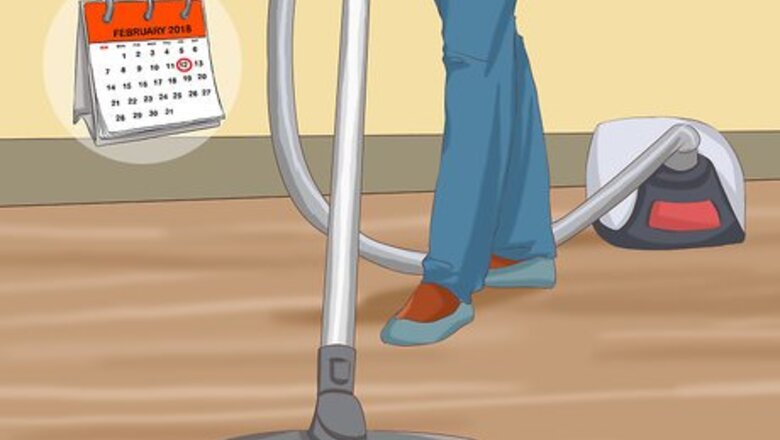
views
X
Expert Source
Kadi DuludeHouse Cleaning Professional
Expert Interview. 22 September 2019.
Spills and stains are also easy to remove with just a damp cloth. You can keep LVT flooring looking good for years to come by using doormats and furniture floor protectors.
Vacuuming, Sweeping, and Mopping
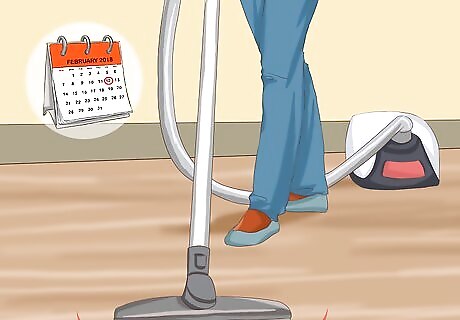
Vacuum or sweep the LVT flooring at least once per week to remove dirt. LVT floors are relatively easy to clean and don’t require any extensive work. Simply vacuum or sweep the floors as soon as you notice the dirt building up. For homes with pets, children, or lots of people, you may need to vacuum several times per week. Keeping the floor free of dirt prevents scratches and helps the floor to look its best. Don’t use the bar beater attachment on the vacuum cleaner, as this can cause scratches. Use a soft-bristled broom to prevent damage to the floor. Make sure to vacuum or sweep under furniture like beds and tables.
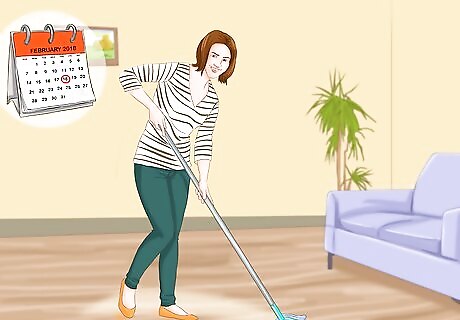
Mop the LVT floor at least once per week to remove grime. Fill up a bucket with warm water. Dip the mop into the water, wring it out so that it’s only slightly wet, and mop the floor in small sections. Always start in a corner or the point that is furthest away, and work your way towards the entrance. Avoid leaving large puddles on LVT flooring, as this can cause damage. If the floor is especially dirty, try adding a few drops of mild dish detergent to the warm water. Don't use commercial cleaning products or vinegar for mopping LVT floors, as these can cause damage.
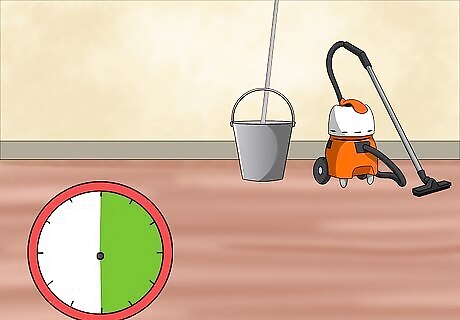
Let the floor dry for approximately 30 minutes before walking on it again. It’s important to let the floor dry so that all of your hard work doesn’t go to waste! Avoid touching or walking on the mopped floor as much as possible until it's completely dry. The actual drying time depends on how much water is on the floor, the temperature, and the humidity. This is especially important if you have young children or animals, as they can easily slip and get hurt.
Removing Stains and Scuff Marks
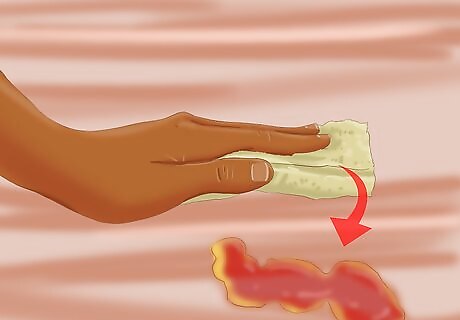
Wipe up any new spills immediately to prevent damage. LVT floors keep best when spills are removed quickly. Use paper towels to remove any food or other solid matter, and then get to work on the liquid. Mop up the liquid with a cloth, paper towels, old towel, or a floor mop depending on how much liquid there is. Remove as much of the spill as possible.
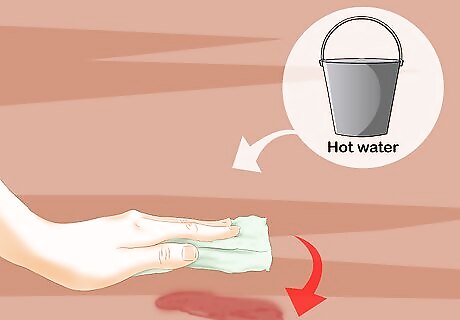
Use a damp cloth with hot water to remove stains or sticky spills. If you couldn’t remove all of the spilled substance or if a stain has formed, start working with hot water. Get a clean cloth and wet it slightly with hot water. Then wipe the stain or spill firmly with the cloth. The cloth only needs to be damp, not saturated. Hot water works very well for sticky liquid spills. If you are having trouble removing the spill or stain, try adding a tiny drop of dish detergent to the hot water. Make sure that the cloth is only damp and then wipe the stain again.
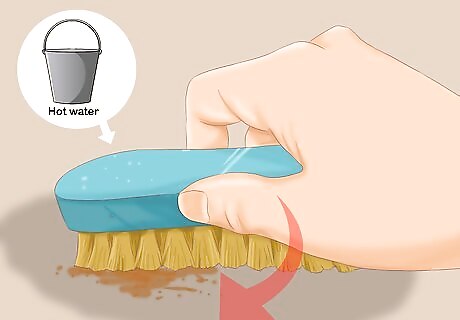
Scrub old or stubborn stains gently with a soft-bristled brush. Sometimes stains require a bit more force to be removed. Make sure that the area is still damp with hot water and get a clean, soft-bristled cleaning brush. Lightly scrub the stain until it disappears. Never use a hard-bristled brush or excessive force when scrubbing LVT floors. This can cause scratches.
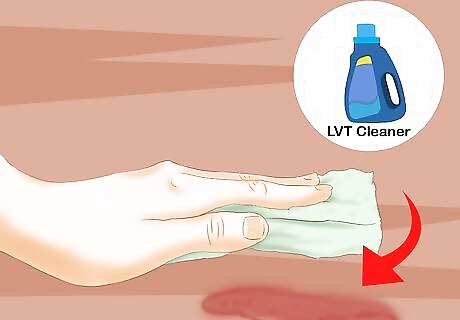
Spot-clean stains that won’t go away with a specialty LVT cleaner. Purchase a commercial LVT cleaning product and follow the manufacturer's directions closely. For most products, simply dampen a cloth with the product and rub the stain lightly until it lifts away. Always read the label of commercial floor cleaning products to make sure they are safe for LVT floors.
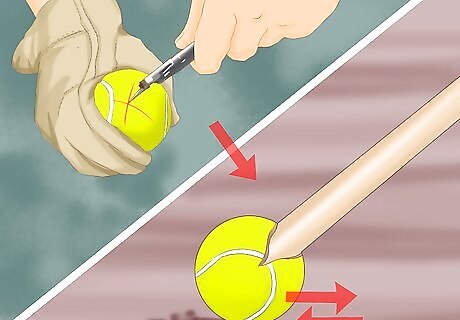
Use a tennis ball at the end of a broom handle to remove scuff marks. If your LVT floor has scuff marks, don’t worry! Use a utility knife to slice an “X” shape in a clean tennis ball. Place the tennis ball onto the end of a broom handle and simply hold the handle to rub the tennis ball over the scuff mark. Alternatively, melamine foam products are also effective at removing scuff marks. These are safe for LVT floors.
Maintaining LVT Floors
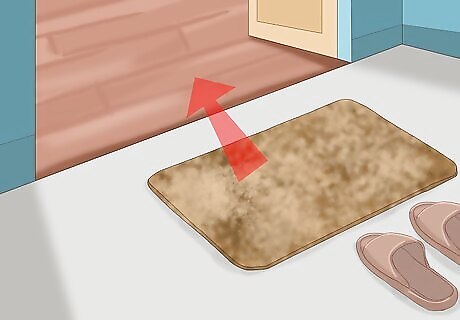
Place doormats outside all of the entrances to minimize dirt. Trapping dirt and moisture outside is an excellent way to stop grime and stains building up inside. Arrange a doormat in front of every entrance to your home where there is LVT flooring. Try to use large doormats for the main entrances to trap as much dirt as possible. Since doormats trap small pieces of dirt and debris, this also prevents scratches from occurring.
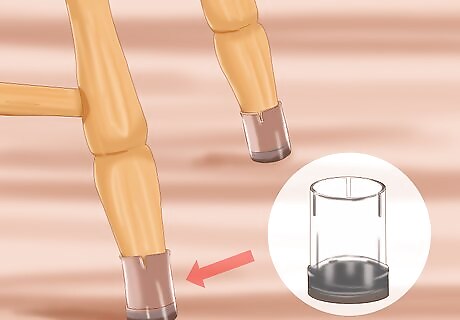
Apply floor protectors to the feet or base of heavy furniture. Although LVT floors are very durable, they can sometimes get scratched if heavy furniture is moved across them. Prevent these scratches by placing floor protectors on the feet of chairs and tables, and on the base of beds, appliances, and cabinets. Simply remove the label on the back of the floor protectors to reveal the adhesive and stick these to the parts of the furniture that touch the LVT. Floor protectors are small, adhesive felt pads. They are inexpensive, durable, and can be purchased from department or home improvement stores. Never push or drag heavy furniture over LVT flooring, as this can cause damage. Always lift furniture instead.
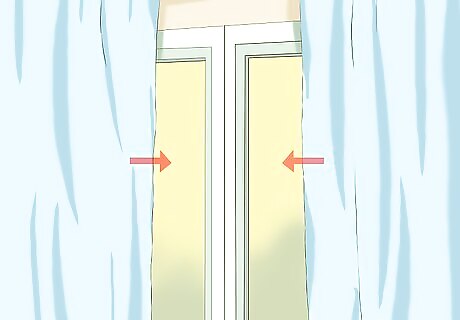
Shut blinds or curtains if possible to prevent discoloration of LVT floors. Sometimes LVT floors can experience discoloration or fading due to excessive sunlight. If there is an overly sunny spot in your home, try to close the blinds or curtains from time to time to help protect the floors.
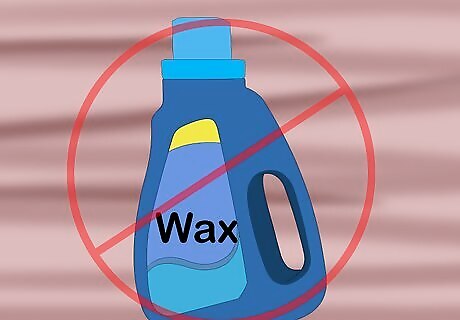
Avoid using wax, as this can dull LVT flooring. While wax is great for keeping some flooring types looking their best, it isn’t suitable for LVT. Not only can wax dull the finish on LVT floors, but it can also make them very slippery. Stick to simply vacuuming and mopping your LVT flooring regularly, and it will look as good as new!


















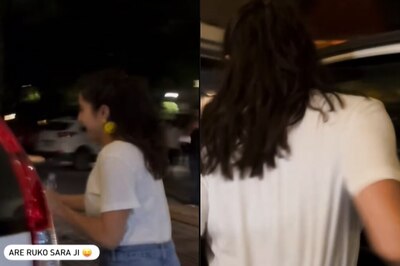

Comments
0 comment